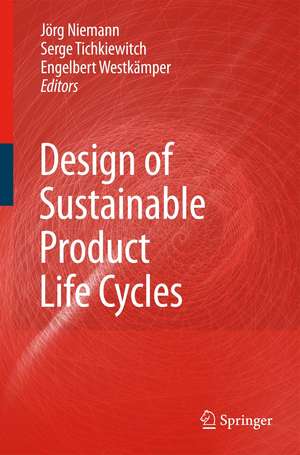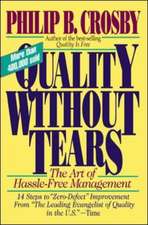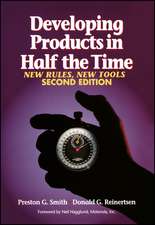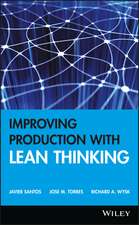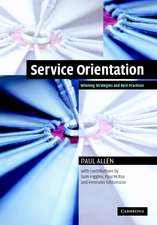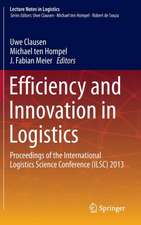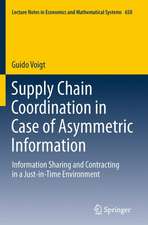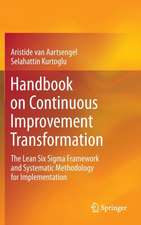Design of Sustainable Product Life Cycles
Editat de Jörg Niemann, Serge Tichkiewitch, Engelbert Westkämperen Limba Engleză Paperback – 19 oct 2010
By this understanding the book delivers a really holistic approach because before a product is physically made a life-long concept and utilization scenarios with closed material and information cycles have to be developed. This promotes a real "thinking in product (life) cycles".
The book addresses professionals as well as researchers andstudents in the field of product life cycle management. Different methods in the field of product design, operation and recycling will be presented and finally merge to an integrated method of product life cycle design. Readers will benefit from the holistic approach which enables them to design successful products by the implementation of closed loop product life cycles.
| Toate formatele și edițiile | Preț | Express |
|---|---|---|
| Paperback (1) | 827.39 lei 6-8 săpt. | |
| Springer Berlin, Heidelberg – 19 oct 2010 | 827.39 lei 6-8 săpt. | |
| Hardback (1) | 644.18 lei 6-8 săpt. | |
| Springer Berlin, Heidelberg – 10 oct 2008 | 644.18 lei 6-8 săpt. |
Preț: 827.39 lei
Preț vechi: 1009.01 lei
-18% Nou
Puncte Express: 1241
Preț estimativ în valută:
158.34€ • 164.70$ • 130.72£
158.34€ • 164.70$ • 130.72£
Carte tipărită la comandă
Livrare economică 14-28 aprilie
Preluare comenzi: 021 569.72.76
Specificații
ISBN-13: 9783642097942
ISBN-10: 3642097944
Pagini: 236
Ilustrații: XXIV, 209 p.
Dimensiuni: 155 x 235 x 12 mm
Greutate: 0.34 kg
Ediția:Softcover reprint of hardcover 1st ed. 2009
Editura: Springer Berlin, Heidelberg
Colecția Springer
Locul publicării:Berlin, Heidelberg, Germany
ISBN-10: 3642097944
Pagini: 236
Ilustrații: XXIV, 209 p.
Dimensiuni: 155 x 235 x 12 mm
Greutate: 0.34 kg
Ediția:Softcover reprint of hardcover 1st ed. 2009
Editura: Springer Berlin, Heidelberg
Colecția Springer
Locul publicării:Berlin, Heidelberg, Germany
Public țintă
Professional/practitionerCuprins
Life cycle modelling.- Life cycle evaluation.- Life cycle information support.- Customer supply networks.- Method for the design of life cycle concepts.- Summary.
Notă biografică
Prof. Westkämper studied from 1967 to 1973 mechanical engineering at the RWTH Aachen. 1977 he doctorate at the RWTH Aachen "with distinction" as Dr.-Ing.
In the years 1977 to 1988, he held senior positions at MBB and AEG.
From 1988 to 1995 Westkämper was director of the Institute for Machine Tools and Production Technology at the University of Braunschweig. Since 1995 Prof. Dr.-Ing. Prof.E.h. Dr.-Ing.E.h.Dr.h.c. mult. Engelbert Westkämper is holder of the Chair and Director of the Institute for Industrial Manufacturing and Management of the University of Stuttgart (IFF), and one of the two directors of the Stuttgart Fraunhofer Institute for Manufacturing Engineering and Automation (IPA).
In the years 1977 to 1988, he held senior positions at MBB and AEG.
From 1988 to 1995 Westkämper was director of the Institute for Machine Tools and Production Technology at the University of Braunschweig. Since 1995 Prof. Dr.-Ing. Prof.E.h. Dr.-Ing.E.h.Dr.h.c. mult. Engelbert Westkämper is holder of the Chair and Director of the Institute for Industrial Manufacturing and Management of the University of Stuttgart (IFF), and one of the two directors of the Stuttgart Fraunhofer Institute for Manufacturing Engineering and Automation (IPA).
Textul de pe ultima copertă
Product life cycle design – Generating sustainable product life cycles explains the importance of a holistic long-term planning and management approach to reaching a maximum product benefit over the entire life cycle. The paradigm of thinking in product life cycles supports manufacturers in shaping successful products. The book promotes various methods and tools for life cycle management and merges them into an integrated planning approach. In this monograph Europe’s leading academic experts in the field of life cycle management have consolidated their expertise.
Readers will learn about different tools and methods for life cycle modelling and digital information support. Industrial examples show how a consistent product data management with closed-loop information cycles enables manufacturers to activate the hidden performance potentials of their products and in their production lines. In this respect Product life cycle design also illustrates the benefits of a networked production including integrated product service systems and innovative business models, and presents methods for evaluating the economic and ecological impacts of life cycle design, highlighting them with practical examples.
The book addresses professionals as well as researchers and students from the field of life cycle management. Practitioners and researchers pursuing life cycle excellence will benefit from the comprehensive coverage of methods and various examples from industry.
Readers will learn about different tools and methods for life cycle modelling and digital information support. Industrial examples show how a consistent product data management with closed-loop information cycles enables manufacturers to activate the hidden performance potentials of their products and in their production lines. In this respect Product life cycle design also illustrates the benefits of a networked production including integrated product service systems and innovative business models, and presents methods for evaluating the economic and ecological impacts of life cycle design, highlighting them with practical examples.
The book addresses professionals as well as researchers and students from the field of life cycle management. Practitioners and researchers pursuing life cycle excellence will benefit from the comprehensive coverage of methods and various examples from industry.
Caracteristici
Holistic approach to lifecycle management and life cycle design Reference work for implementation methods in Research and Practice Includes supplementary material: sn.pub/extras
